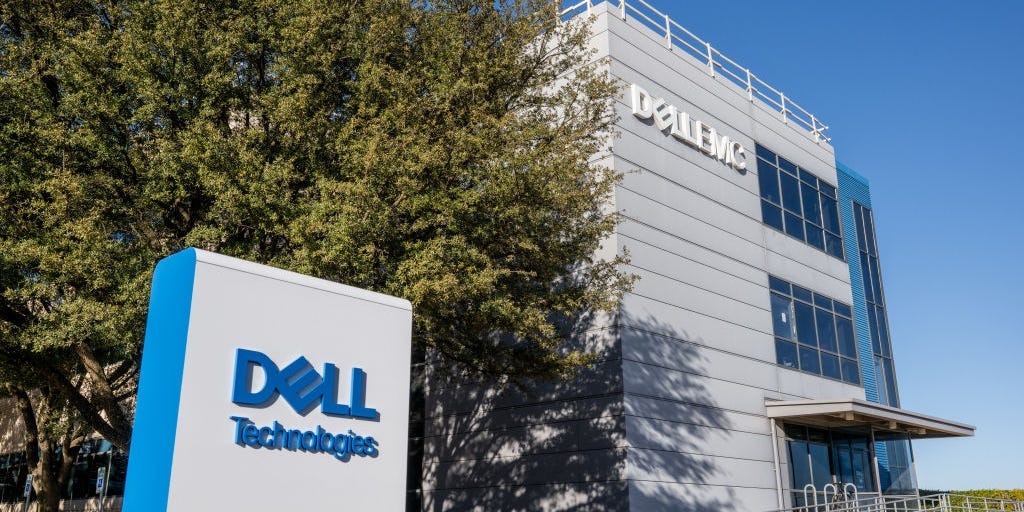Dell has had a hybrid working culture in place for more than a decade — long before the pandemic struck.
“Dell cared about the work, not the location,” a senior employee at Dell who’s worked remotely for more than a decade, told Business Insider last month. “I would say 10% to 15% of every team was remote.”
That flexibility has enabled staff to sustain their careers in the face of major life changes, several employees told BI. It has also helped Dell to be placed on the “Best Place to Work for Disability Equality Index” since 2018.
But in February Dell introduced a strict return-to-office mandate, with punitive measures for those who want to stay at home.
Under the new policy, staff were told that from May almost all will be classified as either “hybrid,” or “remote.”
Hybrid workers will be required to come into an “approved” office at least 39 days a quarter — the equivalent of about three days a week, internal documents seen by BI show.
If they want to keep working from home, staff can opt to go fully remote. But that option has a downside: fully remote workers will not be considered for promotion, or be able to change roles.
The memo states: “For remote team members, it is important to understand the trade-offs: Career advancement, including applying to new roles in the company, will require a team member to reclassify as hybrid onsite.”
“The entire company has been complaining about this behind closed doors,” said one Dell staffer, who works alongside senior management. The employee asked to remain anonymous for fear of reprisals.
Dell told BI in a statement that “in-person connections paired with a flexible approach are critical to drive innovation and value differentiation.”
The approach differs from founder and CEO Michael Dell’s previous support for remote workers.
In 2021, he told CRN that the company’s expanded homeworking culture was “absolutely here to stay.” The billionaire later criticized companies that were enforcing RTO, writing on LinkedIn: “If you are counting on forced hours spent in a traditional office to create collaboration and provide a feeling of belonging within your organization, you’re doing it wrong.”
His office did not respond to a request for comment from BI.
Dell Technologies
By 2022, the company line had not changed: “A long-term ambition for Dell Technologies is for 60% of our workforce to operate remotely on any given day.”
But in March 2023, Dell started to change its policies with a new mandate ordering all staff living within an hour of offices to come in at least three days a week, CRN reported.
Professor Cary Cooper, an organizational psychologist and cofounder of the National Forum for Health and Wellbeing at work, says Dell’s pivot could be a “panicked reaction to a world economy that’s not very buoyant.”
“When that occurs, people turn inwards. They think, maybe if we brought everybody in, it’ll make a difference. We’ll perform better,” Cooper told BI.
“Senior execs somehow think that people in the office are more productive than at home, even though there’s no evidence to back that up.”
There’s also a “pack mentality” at play, says Cooper, with tech companies trying to follow what everybody else is doing, rather than continue with what has worked for them.
“First on the chopping block”
Frustrated workers at Dell spoke out anonymously to BI about how the new policy will affect them.
One said: “We’re being forced into a position where either we’re going to be staying as the low man on the totem pole, first on the chopping block when it comes to workforce reduction, or we can be hybrid and go in multiple days a week, which really affects a lot of us.”
The staffer said she and many colleagues were hired on remote contracts during the pandemic.
The Dell worker lives about a 45-minute drive from the nearest office and works 10-hour shifts four days a week. However, traveling there would be virtually impossible given she no longer drives following a car crash.
She said many of her colleagues would find it very challenging to get to the office three days a week.
‘Approved’ offices
One Dell worker is already feeling the effects of the new policy.
Dell’s list of “approved” sites includes 17 offices in the US and 26 globally — but not the senior employee’s nearest office. “I now know I have no office. So I am remote, or I move if I want to stay.”
BI has viewed a promotion offer sent to the long-serving remote worker around the same time as the RTO mandate was announced.
To accept that promotion, the employee would not only have to start coming into the office, but move state to be near an “approved” site.
Brandon Bell / Getty
Geographically divided teams
Employees also say that Dell’s claims about fostering “in-person connection” do not add up.
It is common for teams at Dell to be spread around the US and even other countries, according to BI’s senior source at Dell, who works across the organization and has access to employee data.
“Every team has people in at least two states, some in three or four. I can’t think of one team where everyone is in one location,” the person said.
That means that even if commuting distances are feasible, many won’t be able to collaborate face-to-face with their teams in the same office.
Another Dell worker told BI: “I would support that if I actually had team members that were local and would actually go on-site. With us being so spread out around the United States, there’s really no point in us going in. I’m going to be in a room with a bunch of people who don’t know how to do my job or how to help me.”
Disproportionate impact
BI’s senior source at Dell used their access to pull data about the composition of remote teams.
“I deal with many many teams across our business. Every team I work with has at least one person if not two or three affected by this policy,” said the senior source at Dell.
“They are overwhelmingly women. This new policy on its face appears to be anti-remote, but in practice will be anti-woman.”
“Quiet firing”
Workers who spoke to BI also said they believe the new measures are a way to push some employees out — a phenomenon known as “quiet firing.”
“This level of micromanagement makes me want to leave Dell,” one said, adding that since the announcement was made, dozens of staff have been discussing quitting in Discord chats.
Two other staff including one based in Germany who spoke to BI also said many people were now considering leaving Dell.
In February last year, Dell laid off about 5% of its workforce, or about 6,600 jobs, per an SEC filing, in the wake of poor PC sales.
“It’s not about culture. Period,” the senior Dell worker agreed. “There are headcount cuts that need to happen and we are suffering. If people leave on their own, they don’t have to pay out severance.”
Cooper agreed that the level of control in this policy would result in some resignations.
“An important source of ill health in the workplace is people feeling they don’t have control and autonomy over their job,” he said. “If they’re downsizing, maybe they’re saying, well, the people are prepared who are not prepared to come into the office. Well, they can go elsewhere.”
Dell’s move is one of the most abrupt changes to remote work policies largely introduced when the pandemic struck. Its progress will contribute to the debate over the future of work and whether working culture will evolve for good.
Are you a worker at Dell or another company pushing staff back to the office? Contact this reporter at pthompson@businessinsider.com




